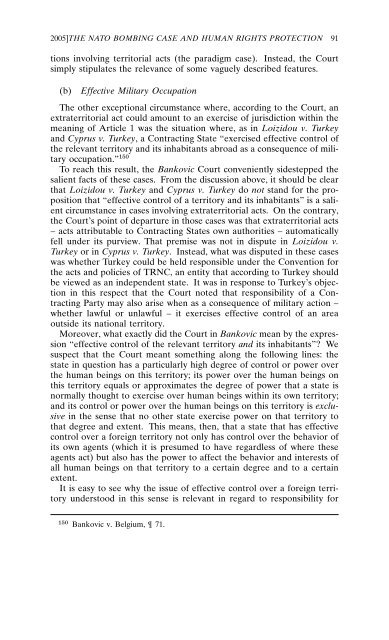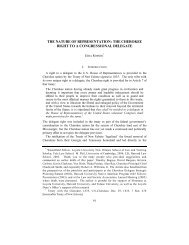THE NATO BOMBING CASE (BANKOVIC ET AL. V. BELGIUM ET AL ...
THE NATO BOMBING CASE (BANKOVIC ET AL. V. BELGIUM ET AL ...
THE NATO BOMBING CASE (BANKOVIC ET AL. V. BELGIUM ET AL ...
You also want an ePaper? Increase the reach of your titles
YUMPU automatically turns print PDFs into web optimized ePapers that Google loves.
2005]<strong>THE</strong> <strong>NATO</strong> <strong>BOMBING</strong> <strong>CASE</strong> AND HUMAN RIGHTS PROTECTION 91tions involving territorial acts (the paradigm case). Instead, the Courtsimply stipulates the relevance of some vaguely described features.(b)Effective Military OccupationThe other exceptional circumstance where, according to the Court, anextraterritorial act could amount to an exercise of jurisdiction within themeaning of Article 1 was the situation where, as in Loizidou v. Turkeyand Cyprus v. Turkey, a Contracting State “exercised effective control ofthe relevant territory and its inhabitants abroad as a consequence of militaryoccupation.” 150To reach this result, the Bankovic Court conveniently sidestepped thesalient facts of these cases. From the discussion above, it should be clearthat Loizidou v. Turkey and Cyprus v. Turkey do not stand for the propositionthat “effective control of a territory and its inhabitants” is a salientcircumstance in cases involving extraterritorial acts. On the contrary,the Court’s point of departure in those cases was that extraterritorial acts– acts attributable to Contracting States own authorities – automaticallyfell under its purview. That premise was not in dispute in Loizidou v.Turkey or in Cyprus v. Turkey. Instead, what was disputed in these caseswas whether Turkey could be held responsible under the Convention forthe acts and policies of TRNC, an entity that according to Turkey shouldbe viewed as an independent state. It was in response to Turkey’s objectionin this respect that the Court noted that responsibility of a ContractingParty may also arise when as a consequence of military action –whether lawful or unlawful – it exercises effective control of an areaoutside its national territory.Moreover, what exactly did the Court in Bankovic mean by the expression“effective control of the relevant territory and its inhabitants”? Wesuspect that the Court meant something along the following lines: thestate in question has a particularly high degree of control or power overthe human beings on this territory; its power over the human beings onthis territory equals or approximates the degree of power that a state isnormally thought to exercise over human beings within its own territory;and its control or power over the human beings on this territory is exclusivein the sense that no other state exercise power on that territory tothat degree and extent. This means, then, that a state that has effectivecontrol over a foreign territory not only has control over the behavior ofits own agents (which it is presumed to have regardless of where theseagents act) but also has the power to affect the behavior and interests ofall human beings on that territory to a certain degree and to a certainextent.It is easy to see why the issue of effective control over a foreign territoryunderstood in this sense is relevant in regard to responsibility for150 Bankovic v. Belgium, 71.









